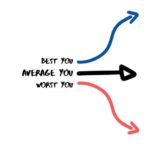Of the vast selection of traumatizing experiences a human being is likely to encounter in their lifetime, being lost is near the top of the list. We all have memories in our lives when we got lost and didn’t know where to go, what to do, or how we got to where we were.
I can still remember the terrifying feeling of losing my mom in a grocery store. I was probably around 7 or 8 years old, and it happened in what felt like the blink of an eye. For just a moment I was distracted by a new cereal, the next second my mom was out of sight. I assumed she went one way, but in fact, she went the other. I was alone in a world I hardly knew anything about, I had zero clue how I got there, who these strangers were, and how I would ever get back home. I was lost.

Somehow, I had the wherewithal to walk over to the customer service desk and explain that I lost my mom. Or perhaps someone else found me crying in a corner and brought me over there. Either way, they announced my mom’s name over the intercom and told her to come pick me up. In just a few minutes I was safe.
Growing up, I’m sure many of you have had a similar or even identical experience. Or perhaps you went hiking without a map and got caught in a storm with no shelter. Regardless, the feeling of being lost is unsettling. As humans, we enjoy predictability and familiarity. This is often why when you travel abroad you seek out a coffee at Starbucks or eat McDonald’s, even though you would rarely do so while at home. It’s a familiar marker where you can let your guard down and get a sense of something ‘normal’.
Defining Lost
To be lost can be hard to define. We use it as somewhat of a blanket word. Because “lost” can apply to a lot of different scenarios.
It could be:
- A small child like me who gets separated from his mother in a supermarket.
- A hiker who underestimates the time it will take them to get to the peak and is forced to set up camp.
- A solo skier who breaks their leg while venturing through a restricted area.
- A depressed student who drinks excessively every weekend in the hopes that it might give them meaning.
- An athlete who only cares about winning, no matter who or what they must sacrifice.
Whether you are talking about someone who is mistaken about their physical location or a person who simply has taken the wrong path to get to their final goal, I think a better way to define lost is someone who quite simply is ‘unable to find their way’.
And here’s the worst part about being lost.
Most of us think we are on the right path. So much so that we will do whatever it takes to convince ourselves of it. When hikers get lost, they start to look for markers, trees, or specific landmarks to point them in the right direction. But because they are often not in a clear mental state they will panic and start to look for things that aren’t there. When they come to an area where they think a large boulder should be but come to find that it’s not there, they simply tell themselves a fictitious idea that perhaps the boulder rolled away.

It’s a dangerous path that they head down, and often a deadly one. When people who are lost begin to panic, they start to make poor choices. And from an outside perspective, it seems like the person is making stupid irrational decisions. But from that person’s point of view, they are making the best choices they are capable of conceiving.
Who Usually Survives?
When studying survival rates of those who get lost in the wild, it’s often not the seasoned male hunters who find a way to survive, but ironically, it’s the inexperienced female hiker. And even more surprisingly, the highest survival rate of any category is children 6 and under. They fair just as well, if not better than many of the fittest hikers and former members of the military.
As the age range goes up, however, children ages 7 to 12 typically have the worst survival rate (good thing I got lost in Superstore, not the Amazon Jungle).
There is no hard evidence as to why these young children are more likely to survive than fully grown adults, but the most probable theory lies in their most basic childhood traits. At that young of an age, your brain is only so far developed. The ability to mental map has not come about and therefore you have no desire to be anywhere that exists in your mind because you can’t even imagine it. At that age, your main desire is to be comfortable. If you are thirsty, you drink. If you’re tired, you rest. If you are cold, you find a dry place to get warm. These are basic survival instincts that a panicked adult will ignore, but they are vital to surviving for multiple days in the wild.
When adults get lost, they run, get tired, start sweating, then night comes and their sweat gets cold and overnight they die from hypothermia.
Because young children cannot fully create mental maps, they also lack the ability to create shortcuts. And as a result, they revert back to what they know. They remap the steps they took and use what they know – unlike an adult who might think they know a faster way when in reality this is entirely based on previous assumptions that have no real merit in these new circumstances.
Finding the Right Path
So where am I going with all of this?
Well, given the fact that none of you are currently lost in a forest right now and are probably comfortably laying on your couch, waiting in line somewhere, or perched up nicely on the toilet (it’s okay, nothing wrong with that), you are most likely not “lost” in the traditional sense. But there is a good chance you are unable to find your way in other areas of your life.
Not knowing where your future is headed, not having a strong sense of belonging to any group, not being sure about who you are as a person. These are all common ways of being lost in life.
As athletes, there a number of different ways you can be lost. Especially when you are on a team where everyone else seems to be on the right track. Hint: They aren’t – we’ve all just gotten good at looking like we know what we’re doing.

And just like the hiker who gets turned around in the wilderness and starts looking desperately for signs that they are on the right path – you are doing the exact same thing with your athletic development. You use arbitrary metrics to evaluate your progress and apply the goals, ideas, ways of thinking that others use in an attempt to find some sort of direction for yourself. Which to a certain extent can be helpful, but sometimes when you get really stuck, you need to stop and think like a child.
Retrace your steps for a few seconds and get a sense of where you are, what you are currently doing, and where do you want to go. Ask yourself as innocently as possible, if what you are currently doing is working. If you are unsure, revert back to what you know to be true, not what you think will work.
The beautiful thing about thinking about a child is that it liberates you. It opens your mind up to thinking in ways that you have long since forgotten about. It lets you retest long-held belief systems. And above all, it allows you to break down complex behaviors and ideas into bite-size chunks that even a 5-year-old could understand.
Solving your problems and getting unlost doesn’t have to be complicated. You just have to stay calm, get curious, be patient, and trust your inner child.
“It is impossible for man to learn what he thinks he already knows”
– Epictetus
It’s a foolish mentality to think that we know everything. And there is a delicate line between arrogance and insecurity. But that balance can simply be defined as a confidence with a healthy dose of humility.
To be a strong, healthy, growing adult means that you are able to work through what you know, but are also willing to ask for help when you are unsure. No one successful person is self-made. We all have to rely on other people in the biggest moments of our lives. Trust that you will be capable to do the work when it’s needed, but also be willing to listen to others when they are trying to pull you out of the wilderness.
Even if it’s the 5-year-old version of you.
-Derek
💡 The inspiration for this article 💡 came from the book Deep Survival by Laurence Gonzales. It’s a gripping book that perfectly illustrates why people survive, why they die, and what we can learn from both. If you are interested in learning more about the overlap of human psychology, behavior, and survival, I would highly recommend you give it a read. 📖 Click here to check it out 📖





